The late Gary Halbert used to ask the following question of his students at his copywriting seminars:
"If you and I both owned a hamburger stand and we were in a contest to see who could sell the most hamburgers, what advantages would you most like to have on your side to help you win?"
Answers from his students included: getting superior meat to make the hamburgers, a superior location, or even having the lowest price.
Once the students had exhausted themselves, Gary would offer them all the advantages they asked for if he could have just one--
When it comes to marketing, the most profitable habit you can adopt is to seek out groups of people who are hungry for a product or service; they are probably going to spend money to get it and if you supply it, you'll get some of that money.
Keyword research is a great way to discover that starving crowd; the more relevant keyword statistics you have, the better you'll be able to judge just how hungry and profitable the marketplace is. And to get a niche market to reveal how profitable it may be, you need answers to three fundamental questions:
- Are there enough hungry people_ easily reached?
- Are the people willing to spend money to satiate their hunger?Are there enough suppliers spending money to reach and feed the hungry people?
Let's look at how keyword research can help you get answers to these questions:
1. Are there enough hungry people easily reached?
The aim is to find enough people looking for products and services to fill their need; but not so many that they attract too much competition, pricing you out of the market.
One way to research market demand online is to use a keyword research tool like Wordtracker:
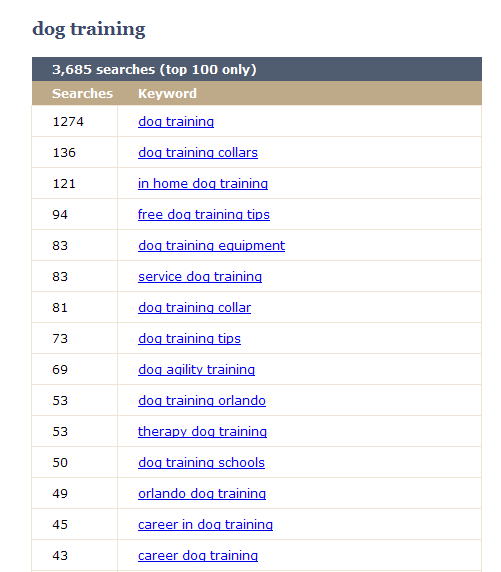
According to Wordtracker, there are roughly 3,685 searches every day by people who want to learn to train their dogs. Now that's a starving crowd!
2. Are the people willing to spend money to satiate their hunger?
Simply put: does your market have money to spend? Do potential customers have credit cards and/or disposable income and are they currently buying products and services in the niche you wish to target?
Students, for example, don't like to spend money. Nor, do I suspect, do people who search for 'debt reduction'.
It's worth noting that if advertisers aren't spending much money in a market, or there are too few of them, it could mean that the market does not spend much money either.
3. Are there enough suppliers spending money to reach and feed the hungry people?
Google is one place where buyers and sellers meet online. But it's not until a potential customer types in a keyword (also known as a search term) and clicks 'Search', that Google auctions off eleven positions on its results page; the sellers then all bid for that click.
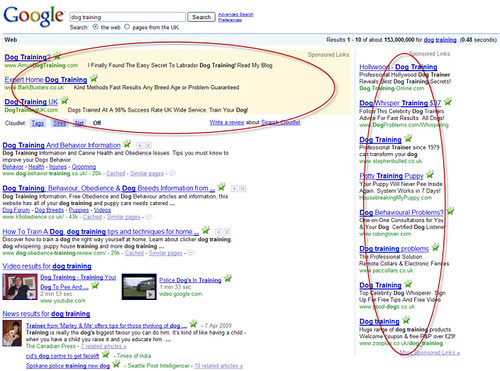
When all eleven positions are filled with advertisers, this usually means there's plenty of competition for that keyword. A high number of ads also usually means a higher cost per click; the cost per click for the keyword 'dog training' in the above example is currently a whopping $3.22.
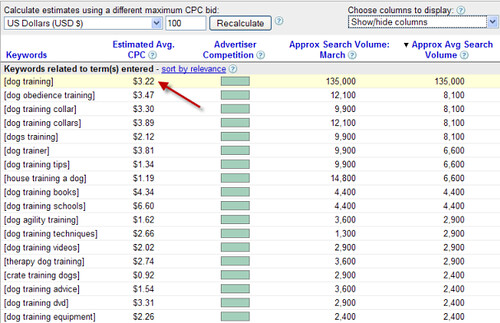
If we compare 'dog training' with a keyword that has just one advertiser e.g. 'dog training types', we can see the cost per click is now just $0.05:
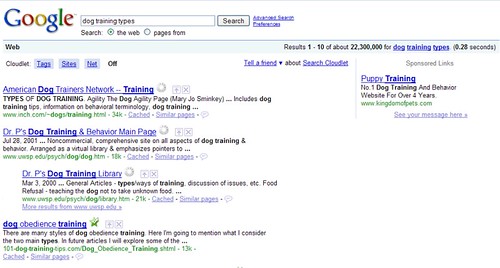
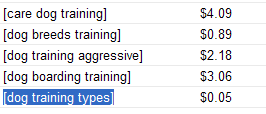
More competitors usually means a higher paying niche, where customers are prepared to pay more to satisfy their hunger; this pushes up the cost per click as advertisers spend more of their resources trying to attract the attention of the searcher. As a marketer this is good to know. If there are many advertisers battling for the click then there must be money in the market--advertisers are not in the business of losing money!
Don't be afraid of competition--it's actually a good thing--it means many people are making money in that particular market. Think of when you find several Chinese restaurants in a row; the area gets known as the place to eat Chinese and attracts more customers. Every restaurant benefits.
The time to worry is when you don't find any advertisers. Don't celebrate when you discover a market with no competition; you're unlikely the first to try to enter the market for the single keyword 'cats' (two advertisers at time of writing). There are few advertisers because there's probably not much money to be made. So don't you then create a product to fill a need you've only guessed at--you'll likely go broke. Just remember that old Wild West saying: "the pioneers are the ones with arrows in their backs."
One way to discover Gary Halbert's "starving crowd" is by looking for a large number of competitors who supply that crowd. The more competition, the more likely that buyers exist in that market. But we at Wordtracker want to help you discover profitable niche markets, not necessarily the most competitive! This allows you, the marketer, to make an important choice: do you compete in a competitive yet profitable niche with many advertisers; or dominate a smaller and potentially less profitable niche with fewer advertisers?
According to AdGooRoo's Search Engine Advertising Update -Q109, approximately 42 percent of Google keywords contain no ads throughout the course of a given month; 13 percent have only one ad; 15 percent have ten or more ads. That should give you pause for thought. Those 15 percent of keywords are likely the largest online markets with the most competition; but that still leaves 30 percent of keywords with between two to nine ads--a hungry yet not starving crowd. But most likely still profitable.
So how can Wordtracker help you discover these profitable markets?
Well, for starters, we aim to count and display the number of advertisers for each keyword like this:
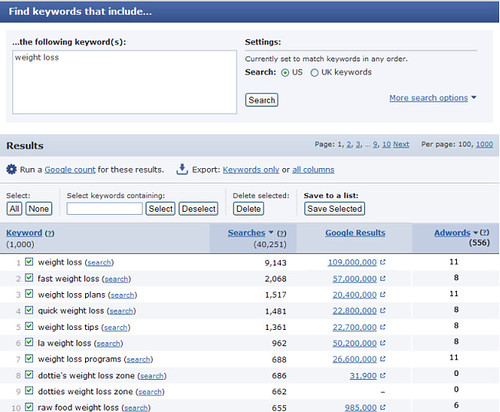
Notice how the adwords column reports both the number of adwords for each keyword in the list, and the total number of adwords (in this case 556), for all 1000 keywords:
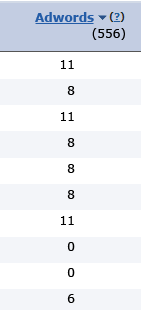
(Note: This is a design mockup. The number of adwords feature will be implemented pending feedback.)
It's interesting to see that 'dotties weight loss zone' has no competition at all. An opportunity perhaps? (Note: That's zero advertisers in a niche that has already proven to be profitable online).
When many keywords in a competitive niche like 'weight loss' all report 11 advertisers, you can dig for more information by clicking on "More Sponsored Links" at the bottom of the search results page:
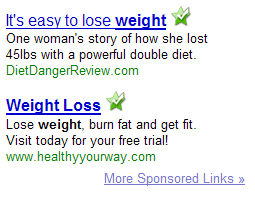
If you click on this link, you see the total number of advertisers bidding for the words 'weight' AND 'loss' in any order is 5,317:

We might also compare the total number of advertisers for broad match advertisers (who bid on the words "weight" "loss" in any order) and exact match advertisers (who bid on the words "weight loss" in that exact order), like this:
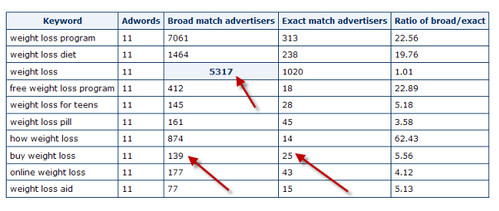
Do you see the keyword 'buy weight loss'? There are 139 broad match advertisers but just 25 exact match advertisers. That gives a ratio of broad advertisers/exact advertisers of 5.56. Do you find that a useful number? Please tell me.
Here are some other issues we'll take into account when reporting the number of adwords for each keyword:
- If you search the Wordtracker US keyword database then we will count adwords ads for the US only; similarly if you select the UK database, then we will count adwords ads for the UK only.
- We will count the ads when most relevant: for the US, this is during office working hours 9am - 8pm (to cover East & West coast). This is the time when you expect the maximum number of advertisers have their campaigns running and the time most buyers traditionally buy.
So now it's your turn.
Has this post been helpful? Do you find reporting the number of adwords for each keyword a useful feature? Do you agree that a large number of advertisers suggests a starving crowd and likely a profitable niche?
Please let me know your thoughts in a comment below (even if you disagree).
I really appreciate your feedback.
As always,
-Mike Mindel
Technorati Tags: number of adwords, profitable niche, gary halbert, hungry people, mike mindel, starving crowd, suppliers spending money, research market demand online, dog training research, wordtracker, profitable markets, dotties weight loss zone, weight loss, broad advertisers, exact advertisers, ppc, pay per click
